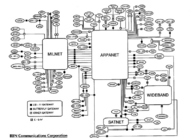A Vulnerable Network: Undersea Internet Cable Attacks
By
2009, Vol. 1 No. 11 | pg. 1/1 Multiple undersea internet cables were mysteriously severed and subsequently gained significant attention in the beginning of 2008. The attacks on those cables highlighted the enormous amount of internet traffic that uses the undersea cable system, which carries many times more traffic than the satellite system does. The focus on the undersea internet and its growth and protection have become much more of a main stage topic since February 2008. The events occurred over a series of days and were carried out predominantly in Middle Eastern waters. Many countries had their internet services dramatically reduced as a result of the attacks. From late January to early February, as many as nine undersea internet cables were severed. Dr. Richard Sauder wrote an interesting review of the information provided by various reporting agencies on these events.
These points outline the importance of undersea cable technology and its protection. How we manage security issues revolving around the maintenance and use of these giant cables will play a major role in the continuity and future use of the net. Building new alliances and agreements that are contemporary with the technology that now exists related to the Internet has to be considered a major issue confronting government today. The very fact that most of the cable attacks occurred in Middle Eastern waters carries many political implications. While many unrelated sources have claimed that Iran was the target of these events, many countries suffered major reductions in internet traffic capabilities as well. Various reporting agencies discussed the following list of undersea internet cables that were compromised during that short timeframe in early 2008: A cable off of Marseille, France; two off of Alexandria, Egypt; one off of Dubai, in the Persian Gulf; one off of Bandar Abbas, Iran in the Persian Gulf; one between Qatar and the UAE, in the Persian Gulf; one in the Suez Canal, Egypt; and a cable near Penang, Malaysia. Additionally, an initially unreported cable cut on 23 January 2008 affected the following undersea internet cables: the SeaMeWe-4 (South East Asia-Middle East-Western Europe-4) near Penang, Malaysia; the FLAG Europe-Asia near Alexandria; FLAG cable near the Dubai coast; FALCON undersea internet cable near Bandar Abbas in Iran; and SeaMeWe-4, also near Alexandria (Kaleej, 2008). The impact of these cables being severed is summed up nicely by Computer Weekly: “As the undersea cables carry about 95% of the world’s telephone and internet traffic, any widespread internet downtime can have devastating economic implications” (2008). With dozens of new cables to be laid in the next few years, as reported by PC Pro in July of 2008, any disruption in the cables will have massive impact on internet users. Conversely, one could argue that with more cables being laid, some redundancy will occur so that the increased number of undersea cables will ensure greater continuity in times of cable breakdown. In any event, protecting these cables has become more of a hot topic after theses attacks. The idea that submarines may carry men close enough to the cables to cut or otherwise damage them brings other goals to mind. A possibility exists that during the downtime of the cables, monitoring devices may be attached to gain some amount of unrestricted access to the transmissions running through the cable. Competing governments have a direct pecuniary interest in the construction, laying, and maintenance of these cables. Control of or influence on these cables by any one entity could dramatically impact internet availability for a given population as well as information access by various governments. The undersea cable network still carries most internet traffic and is still growing. The issue is not in building the cables, but in protecting them. Many traditional agreements between nations regarding information transfer and jurisdiction will come under fire as this unbridled communication network grows and its security becomes more and more of an international concern. ReferencesSauder, R. (2008). Connecting the many undersea dots. Retrieved Nov 30m 2008, from http://www.cyberspaceorbit.com/ConnectingTheDots.htm Khaleej Times Online. (2008). Cable damage hits 1.7m internet users in UAE. Retrieved November 30, 2008, from http://www.khaleejtimes.com/DisplayArticle.asp?xfile=data/theuae/2008/February/theuae_February155.xml§ion=theuae PCPRO. (2008). Internet cable laying boom. Retrieved on November 30, 2008, from http://www.pcpro.co.uk/news/210999/internet-cablelaying-boom.html Clarke, R. (2007). Breakpoint. New York: Berkeley Books. Suggested Reading from Inquiries Journal
Inquiries Journal provides undergraduate and graduate students around the world a platform for the wide dissemination of academic work over a range of core disciplines. Representing the work of students from hundreds of institutions around the globe, Inquiries Journal's large database of academic articles is completely free. Learn more | Blog | Submit Latest in Computer Science |










